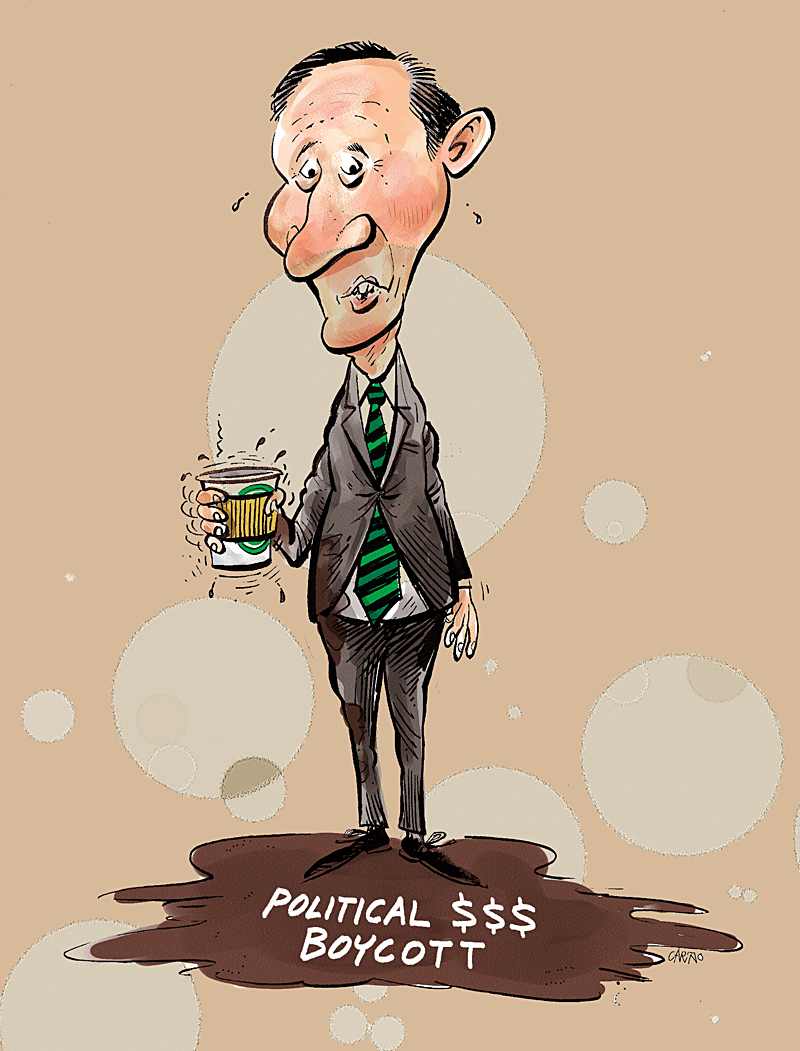Starbucks CEO Howard Schultz’s pledge to no longer contribute to presidential or congressional campaigns drew a lot of sympathetic publicity for him and his corporation last year. But while Schultz’s money boycott was aimed at persuading pols to tackle the deficit, his company was quietly spending hundreds of thousands of dollars to persuade those same politicians to pass costly laws benefiting Starbucks’ bottom line.
The Seattle coffee giant spent $860,000 in 2011 on salaries and expenses to lobby the White House, Congress, and federal agencies on legislation involving taxes, trade, health care, and banking. Among its political targets was the reduction of import duties and other non-tariff barriers related to free-trade agreements with Panama, Colombia, and Korea.
According to a new accounting by OpenSecrets.org, the D.C. political-money watchdog, Starbucks joined Boeing (the 14th biggest lobbying spender, at $155 million) and other major American companies in pushing for at least five corporate-cost-cutting trade bills, some of which were approved last year.
One of them, the United States/Korea Free Trade Agreement Implementation Act, sponsored by Republican House Majority Leader Eric Cantor and signed into law by Barack Obama, is estimated to cost taxpayers $53 million. Like some of the other legislation sought, the new measure effectively lowers corporations’ costs of doing business while increasing the public’s burden. That outcome seems to conflict with Schultz’s stated aim of boycotting political donations until the president and Congress do something about the nation’s soaring debt.
A Starbucks spokesperson tells the Weekly in an e-mail response that Starbucks “spends much less on lobbying than most other Fortune 500 companies,” noting that “None of those funds were political contributions.” The company’s lobbyists work on issues “important to our partners (employees), customers, and shareholders—collectively representing Americans from all 50 states and all walks of life,” said the spokesperson. “Expressing concern with our political leaders about the lack of cooperation in Washington should not disqualify us from discussing topics of importance.”
Schultz is apparently still maintaining his anti-contributions pledge, though he has long been a regular political donor, and only a few months prior to the pledge contributed $5,000 to Sen. Maria Cantwell’s re-election campaign.
According to the Center for Responsive Politics, Schultz and his wife Sheri have given $183,650 to federal candidates and political committees in the past 18 years—overwhelmingly to Democrats. They donated only $1,000 to a Republican—the 2000 presidential campaign of Sen. John McCain.
When SW last updated Schultz’s donation boycott, in November, 23,147 people had signed the pledge page in four months at the chairman’s Upward Spiral website (upwardspiral2011.org). Now, about three months later, the enthusiasm has slowed, with just 410 additional signatories.
Not all Starbucks execs are on board. At least four donated after Schultz announced the pledge, including Steve Johannesen, a director of international development, who gave $2,000 to President Obama’s re-election campaign.
K&L Gates, Starbucks’ law and lobbying firm, also donated $40,000 to current and prospective congressional members through its political action committee. Some of that money came indirectly from Starbucks: Schultz’s corporation—which spent $580,000 on its own in-house lobbying effort last year—paid K&L $280,000 to lobby needed legislation in 2011.
Meanwhile, a spin-off of Schultz’s donation boycott, Create Jobs for USA, appears to be chugging right along. Starbucks stores and the jobs-creation website accept $5 donations and give out free “Indivisible” wristbands in return.
Schultz, in partnership with Opportunity Finance Network, promises 100 percent of all donations will go toward helping “create and sustain jobs in underserved communities.” Starbucks donated $5 million to prime the effort. Create Jobs has not yet reported how much has been contributed by donors.
Some critics call the drive a Starbucks “marketing ploy.” But others appear upbeat and eager to join in. “Starbucks isn’t a nonprofit organization,” observes one commenter on createjobsforusa.org, “so if they profit while creating a social movement that creates jobs and benefits Americans, I say ‘Bravo!’ and will get my wristband.”








